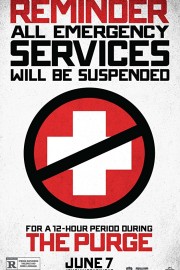The Purge
“The Purge” is an interesting idea for a movie, but it doesn’t really translate into being an interesting movie. At least, not in the way it’s been written and directed by James DeMonaco, which merges the “found footage” sensibility of “Paranormal Activity” with the nihilistic violence of “Saw,” while trying to aim for the same sort of satiric commentary Stanley Kubrick attempted in “A Clockwork Orange.” Talk about biting off more than you can chew.
The reference to “Orange,” and in particular, it’s infamous scene where Alex and his Droogs break into a house, and proceed to terrorize an older couple, is the one that kept popping into my head as I watched “The Purge.” In it, America is experiencing a rebirth. Unemployment is at 1%, and crime is at an all-time low. Of course, both can be attributed to a recent tradition known as “the Purge,” one night out of the year where, for 12 hours, all crime, including murder, is legal. Sounds fun, right? At the very least, it’s a good reason to stay in for the night for people able to afford the best in security systems, while those less fortunate are having to fend for themselves. Security salesman James (Ethan Hawke) and his family are one of those fortunate families, but as the Purge starts, a chain of events will occur that will shake their ideas of the usefulness of the Purge forever.
Again, interesting idea, as well as a timely social one in this time of the 99% vs. the 1%, and a disturbing level of violence that seems to go unchecked by political interests. But the film fails to follow-through on any of its commentary, instead, focusing on disturbing violence, and a gleeful twisting of the idea of “survival of the fittest.” The film imagines an America of the not-so-distant future, where yearly genocide is condoned by the public, and approved by the government. Personally, I’d rather live in the world of “Hunger Games,” and I’m not just talking about in real life.










